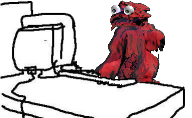TheHeroOfTime
Arcane
Now that the release of Rare replay on Xbox One (August 4) is very close, I've been reading a bit about some games that are included in the compilation. I was very surprised to see such negative review games like Perfect Dark (also to Goldeneye N64, not included in the compilation) and Perfect Dark Zero, which its "ambiguity" is criticized in guiding the player for the objectives you have to perform at the level as a mistake in one of these objectives means having to restart the entire level. I also read criticisms Battletoads, especially the famous and classic level Turbo Tunnel, where the player ends up dying practically over and over again until end level learning to play.
On the other hand, I've also been reading articles critical of the Trial and error as a way of creating "artificial difficulty", on the other hand I also read other articles and forums where mechanical defended as a way to teach the player to play a game, making the latter responsible for their own victory or defeat. For example, the Souls saga in a greater or lesser extentalways got accused of this type of mechanic. I think it would be interesting to see what you think about it. I would also like to know the opinion of those who played Goldeneye and Perfect Dark on her day (preferably in the normal difficulties of the games, which is the most balanced) how the objectives are structured, what you know and what you can know as a player about them throughout the levels. Perfect Dark is a game that I have crushed to exhaustion, it's my favourite FPS game, but I played Goldeneye very little in comparison when i was a child and it was not until a couple of years ago to when I could get by myself a cartridge of the same on Ebay.

On the other hand, I've also been reading articles critical of the Trial and error as a way of creating "artificial difficulty", on the other hand I also read other articles and forums where mechanical defended as a way to teach the player to play a game, making the latter responsible for their own victory or defeat. For example, the Souls saga in a greater or lesser extentalways got accused of this type of mechanic. I think it would be interesting to see what you think about it. I would also like to know the opinion of those who played Goldeneye and Perfect Dark on her day (preferably in the normal difficulties of the games, which is the most balanced) how the objectives are structured, what you know and what you can know as a player about them throughout the levels. Perfect Dark is a game that I have crushed to exhaustion, it's my favourite FPS game, but I played Goldeneye very little in comparison when i was a child and it was not until a couple of years ago to when I could get by myself a cartridge of the same on Ebay.








![The Year of Incline [2014] Codex 2014](/forums/smiles/campaign_tags/campaign_incline2014.png)











